
Research
Peer-reviewed Articles
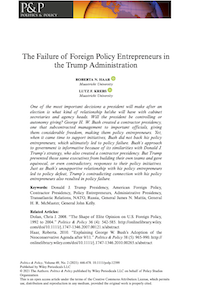 “The Failure of Foreign Policy Entrepreneurs in the Trump Administration” with Roberta Haar. Politics & Policy, 49 (2), 446–478. 2021.
“The Failure of Foreign Policy Entrepreneurs in the Trump Administration” with Roberta Haar. Politics & Policy, 49 (2), 446–478. 2021.
Abstract. One of the most important decisions a president will make after an election is what kind of relationship he/she will have with cabinet secretaries and agency heads. Will the president be controlling or autonomy giving? George H. W. Bush created a contractor presidency, one that subcontracted management to important officials, giving them considerable freedom, making them policy entrepreneurs. Yet, when it came time to support initiatives, Bush did not back his policy entrepreneurs, which ultimately led to policy failure. Bush’s approach to government is informative because of its similarities with Donald J. Trump’s strategy, who also created a contractor presidency. But Trump prevented those same executives from building their own teams and gave equivocal, or even contradictory, responses to their policy initiatives. Just as Bush’s unsupportive relationship with his policy entrepreneurs led to policy defeat, Trump’s contradicting connection with his policy entrepreneurs also resulted in policy failure.
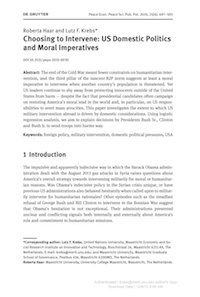 “Choosing to Intervene: US Domestic Politics and Moral Imperatives” with Roberta Haar. Peace Economics, Peace Science and Public Policy, 21 (4), 497–505. 2015.
“Choosing to Intervene: US Domestic Politics and Moral Imperatives” with Roberta Haar. Peace Economics, Peace Science and Public Policy, 21 (4), 497–505. 2015.
Abstract. The end of the Cold War meant fewer constraints on humanitarian intervention, and the third pillar of the nascent R2P norm suggests at least a moral imperative to intervene when another country’s population is threatened. Yet US leaders continue to shy away from protecting innocents outside of the United States from harm — despite the fact that presidential candidates often campaign on restoring America’s moral lead in the world and, in particular, on US responsibilities to avert mass atrocities. This paper investigates the extent to which US military intervention abroad is driven by domestic considerations. Using logistic regression analysis, we aim to explain decisions by Presidents Bush Sr., Clinton and Bush Jr. to send troops into harms way.
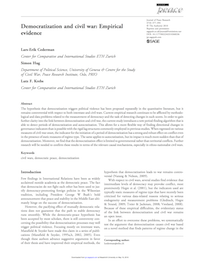 “Democratization and Civil War: Empirical Evidence” with Lars-Erik Cederman & Simon Hug. Journal of Peace Research 47(4): 377–394. 2010.
“Democratization and Civil War: Empirical Evidence” with Lars-Erik Cederman & Simon Hug. Journal of Peace Research 47(4): 377–394. 2010.
Abstract. The hypothesis that democratization triggers political violence has been proposed repeatedly in the quantitative literature, but it remains controversial with respect to both interstate and civil wars. Current empirical research continues to be afflicted by methodo- logical and data problems related to the measurement of democracy and the task of detecting changes in such scores. In order to gain further clarity into the link between democratization and civil war, the current study introduces a new period-finding algorithm that is able to detect periods of democratization and autocratization. This allows for a more flexible way of finding directional changes in governance indicators than is possible with the rigid lag structures commonly employed in previous studies. When regressed on various measures of civil-war onset, the indicator for the initiation of a period of democratization has a strong and robust effect on conflict even in the presence of static measures of regime type. The same applies to autocratization, but its impact is much more sudden than that of democratization. Moreover, we find that the democratization effect is limited to governmental rather than territorial conflicts. Further research will be needed to confirm these results in terms of the relevant causal mechanisms, especially in ethno-nationalist civil wars.
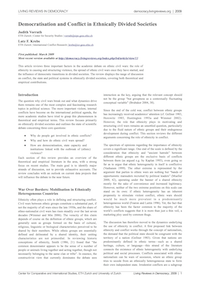 “Democratisation and Conflict in Ethnically Divided Societies” with Judith Vorrath. Living Reviews in Democracy 1. 2009.
“Democratisation and Conflict in Ethnically Divided Societies” with Judith Vorrath. Living Reviews in Democracy 1. 2009.
Abstract. This article reviews three important factors in the academic debate on ethnic civil wars: the role of ethnicity in causing and structuring violence, the spread of ethnic civil wars once they have started, and the influence of democratic transitions in divided societies. The review displays the range of discussion on conflict, the state and political systems in ethnically divided societies, covering both theoretical and empirical contributions.
Edited Volumes
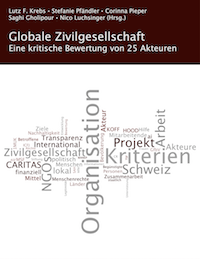 Globale Zivilgesellschaft: Eine kritische Bewertung von 25 Akteuren with Stefanie Pfändler, Corinna Pieper, Saghi Gholipour & Nico Luchsinger (eds.). 2009. Norderstedt: BoD. ISBN: 978-3839109915.
Globale Zivilgesellschaft: Eine kritische Bewertung von 25 Akteuren with Stefanie Pfändler, Corinna Pieper, Saghi Gholipour & Nico Luchsinger (eds.). 2009. Norderstedt: BoD. ISBN: 978-3839109915.
Abstract. Die Zivilgesellschaft spielt eine zentrale Rolle in der Gesellschaft. Sie vermittelt zwischen privaten Individuen und den institutionalisierten Organisationen der Staatsgewalten und der Wirtschaft. Häufig erfüllt sie ausgleichende Funktionen und stellt sicher, dass die Interessen vernachlässigter Mitglieder der Gesellschaft Gehör bekommen. Dabei kann sie auch provisorische Lösungen für Probleme bieten, die (noch) nicht von Staat und Wirtschaft adressiert werden. Als solches ist die Zivilgesellschaft nicht nur wichtiger Bestandteil eines gesunden Zusammenlebens auf der nationalen Ebene, sie eignet sich auch besonders als Werkzeug, um Probleme internationaler Natur anzugehen.Dieses Buch stellt den Versuch interessierter Beobachter dar, einen kritischen Blick auf das Funktionieren der globalen Zivilgesellschaft zu werfen. Mittels eines eigens erstellten Kriterienkatalogs erfolgt die Bewertung 25 zivilgesellschaftlicher Akteure aus den Themenbereichen humanitäre Hilfe, Entwicklung, Konfliktbewältigung, Friedensstiftung, Menschenrechte und Medien, aus den Welt-Regionen Afrika und Naher Osten sowie aus der Zusammenarbeit mit der öffentlichen Hand. Hierbei entsteht nicht nur ein Bild einzelner Organisationen und Bewegungen, sondern es werden auch Herausforderungen deutlich, die sich der gesamten Zivilgesellschaft stellen.
Working Papers & Reports
 “Supporting academic advising through self-directed, blended learning” with Mindel van de Laar and Katerina Triantos. UNU-MERIT, Working Paper No. 21/2021, Maastricht, 2021.
“Supporting academic advising through self-directed, blended learning” with Mindel van de Laar and Katerina Triantos. UNU-MERIT, Working Paper No. 21/2021, Maastricht, 2021.
Abstract. Academic advising and perceived agency in study choices often lead students to assembling a more suitable curriculum and ultimately lead to better learning outcomes. This paper argues that helping students sample the experience of upcoming education units can support traditional academic advising and assist students in critical reflection when picking electives.
We examine how online previews of upcoming courses offered in addition to information and advising supports students in making smart choices. Students were surveyed both before and after reviewing online course excerpts. Data was supplemented with feedback by advisors and compared with previous cohorts lacking the online component. Findings indicate students used the material to test initial plans and assumptions and became more critical in making their track selection.
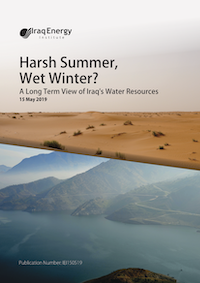 “Harsh Summer, Wet Winter? A Long-Term View of Iraq’s Water Resources” with Robert Tollast and Nick Waters. 2019. London: Iraq Energy Institute.
“Harsh Summer, Wet Winter? A Long-Term View of Iraq’s Water Resources” with Robert Tollast and Nick Waters. 2019. London: Iraq Energy Institute.
Abstract. This report uses open source photography and satellite imagery to observe changes in the level of the Tigris river at Mosul during different stages, looking at historic imagery and dam reservoir activity across a section of the river basin. This project, which arose from a Bellingcat workshop in 2018, followed photographs on social media in Iraq in June 2018 showing alarmingly low levels in the Tigris river, when the river should have been just passing its peak discharge of May-June.
We were interested in seeing whether these levels were unusual for the time of year. The Tigris river has historically had an unpredictable flow regime, partly due to the precipitous course of its tributaries, but it is clear that human activity and climate change have radically altered the characteristics of this river, with clear implications for water management in Iraq. In sum, this is not a case of dry summers and wet winters, but instead seeing a holistic view of a decades-long challenge.
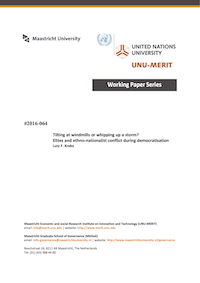 “Tilting at windmills or whipping up a storm? Elites and ethno‐nationalist conflict during democratisation”. UNU-MERIT, Working Paper No. 64/2016, Maastricht, 2016.
“Tilting at windmills or whipping up a storm? Elites and ethno‐nationalist conflict during democratisation”. UNU-MERIT, Working Paper No. 64/2016, Maastricht, 2016.
Abstract. How much influence do political leaders have on the likelihood of ethnic civil war? Two opposing theoretical positions exist: elite manipulation theorists argue that leaders incite ethno-nationalism to secure their hold on power (Snyder 2000, Gagnon 2004). However, political leaders rarely have both the ability and the ideal environment to manipulate identities (Brubaker 1998). Instead, structural forces like ethnic security dilemmas could be driving forces behind conflict onset (Posen 1993), leaving elites virtually without influence on the probability of civil-war onset.
This study uses large-N regressions to test both theories and a hybrid alternative focussing on two problems inherent to democratisation settings: the need to settle the demos question and ongoing competition between incumbent and challenging political leaders. Results confirm that ongoing democratisation phases, the prior existence of security worries caused by politicised ethnic divisions, and factors threatening incumbents have a significant positive influence on the risk of civil war.
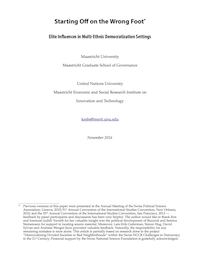 “Starting Off on the Wrong Foot: Elite Influences in Multi-Ethnic Democratization Settings”. Open Science Framework, 2016.
“Starting Off on the Wrong Foot: Elite Influences in Multi-Ethnic Democratization Settings”. Open Science Framework, 2016.
Abstract. Elite manipulation theories, particularly the idea of diversionary war, have played a substantial role in the analysis of ethnic civil wars. Some, as Gagnon (2004), argue that political elites have shaped the perceptions of their population to create the illusion of a threatening outside world. This, driven to the extreme, would then give rise to an ethnic security dilemma and potentially, civil war. Even if violence does not break out, divisive elite manipulation increases the likelihood of self-perpetuating injustices between members of ethnic groups. Snyder (2000) argues that democratizing multi-ethnic states face an extraordinarily high risk of such conflict.
During and shortly after democratization processes, when political leaders are most in need of popular backing, the temptation to seek the support of a fairly well defined ethnic group rather than that of the multi-ethnic demos that existed so far may be strong. Especially if group identities have been reified through institutionalization – as is frequently the case in multi-ethnic societies – ready-made social cleavages may be available for politicians to exploit. However, Brubaker (1998) convincingly argues that political leaders rarely have both the ability and ideal environment to manipulate identities for their own personal need that the theory of diversionary war suggests.
This paper provides an initial analysis of the first in a series of democratization cases in ethnically heterogeneous settings: the Burundian democratization process of the late 1980s and early 1990s. Based on news agency and local newspaper reports, this paper attempts to assess to what degree elites stimulate ethnic hostilities in their bid for political power and to what extend they react to credible already present in the population.
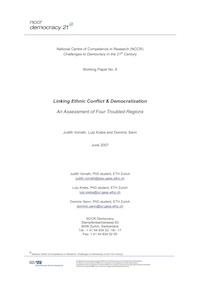 “Linking Ethnic Conflict & Democratization: An Assessment of Four Troubled Regions” with Judith Vorrath & Dominic Senn. NCCR Challenges to Democracy in the 21st Century, Working Paper No. 6, Zurich, 2007.
“Linking Ethnic Conflict & Democratization: An Assessment of Four Troubled Regions” with Judith Vorrath & Dominic Senn. NCCR Challenges to Democracy in the 21st Century, Working Paper No. 6, Zurich, 2007.
Abstract. Ethnic divisions have long been linked to civil war and recent history seems full of examples. However, the mechanisms that lead a society down the path of ethnic conflict are not yet fully understood. This working paper presents the results of a series of workshops discussing the link between ethnicity and conflict under the condition of regime change.
Based on contributions of area experts for four regions - the Balkans, the Caucasus, the Great Lakes of Africa and the Middle East – this paper tries to answer four guiding questions: Is there a link between ethnicity and conflict? Are there transnational spillover effects? Does democratization contribute to ethnic violence? And are there institutional solutions for divided societies?
Conference Papers
- “Betrayal by Portrayal: How Descriptions of the EU Advance Populism” presented at the 2019 ECPR General Conference, Wrocław; and the 13th EISA Pan-European Conference on International Relations, Sofia, 2019.
- “Caring Interdisciplinarians: Teaching Civic Engagement in Public Policy” presented at the 2019 Joint International Teaching and Learning Conference, Washington, 2019.
- “Choosing to Intervene: US Domestic Politics & Moral Imperatives” with Roberta Haar. Paper presented at the 15th Jan Tinbergen European Peace Science Conference, University of Warwick, Coventry, 2015.
- “Endogeneity of Political Violence During Democratization.” Paper presented at the 55th ISA Annual Convention, Toronto, 2014.
- “Are Anocracies More Likely to Experience Civil War?” with Pui-Hang Wong. Paper presented at the joint ISA-PSS Conference, Budapest, 2013; and the 14th Jan Tinbergen European Peace Science Conference, International Institute of Social Studies, The Hague, 2014.
- “Democratization and Political Violence: Capturing the Whole Process.” Paper presented at the joint ISA-PSS Conference, Budapest, 2013.
- “Tilting at Windmills or Whipping Up a Storm? Elites and Ethno-Nationalist Conflict during Democratization.” Paper presented at the 54th ISA Annual Convention, San Francisco, 2013; and the joint ISA-PSS Conference, Budapest, 2013.
- “Starting off on the Wrong Foot: Elite Influences in Multi-Ethnic Democratization Settings”. Paper presented at the Annual Meeting of the Swiss Political Science Association, Geneva, 2010; 51st ISA Annual Convention, New Orleans, LA, 2010; and the 53rd ISA Annual Convention, San Francisco, 2013.
- “How Influential are Political Leaders? Elites and Ethno-Nationalist Conflict during Democratization.” Paper presented at the NCCR Challenges to Democracy in the 21st Century, Grindelwald, 2009; the 5th ECPR General Conference, Potsdam, 2009; and the workshop “Democratization and Conflict”, Zurich, 2009.
- “Ethnicity, Political Leaders and Violence: the Aftermath of the Hariri-Killing.” Paper presented at the 6th Pan-European Conference on International Relations, Torino, 2007.
- “Trust and Social Cohesion: An Agent-Based Model.” Paper presented at the 4th ECPR General Conference, Pisa, 2007.